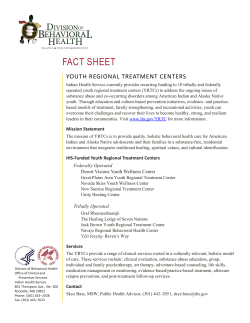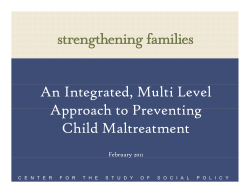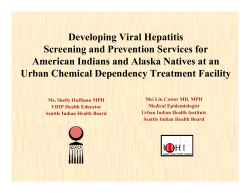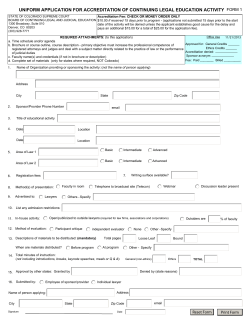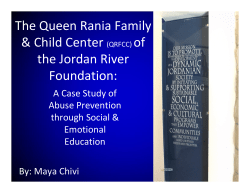
Aberdeen Area Youth Regional Treatment Center Aberdeen Area
Aberdeen Area Youth Regional Treatment Center Aberdeen Area 12451 Hwy 1806 Mobridge, SD 57601 Phone: 605-845-7181 Fax: 605-845-5072 Director: Lavon Booth Email: lavon.booth@ihs.gov Website: http://www.ihs.gov/MedicalPrograms/behavioral/AAYRTC/index.cfm Population: American Indian Age: 13 to 17 years old at time of admission (18 yrs. olds on a case by case) Gender: Male & Female Capacity (Number of Beds): 18 Admissions Process: Cohort Model (by Gender) Average Length of Stay: 60 days Evidence-Based Practices: Trauma Focused Cognitive Behavioral Therapy Cultural Treatment Models: White Bison, Takoja Niwiciyape: Giving Life to the Grandchildren Project Making Medicine, American Indian Life Skills, VOICES: A program of self discovery and empowerment for girls. After Care Services: Referral Services, Follow up services provided 72 hours, 30 days, 6 months, and 1 year post discharge. Number of Tribes Served: 19 States that Received Services: North Dakota, South Dakota, Nebraska, Montana, and Iowa but not limited to those states only Accreditation: Commission on the Accreditation of Rehabilitation Facilities (CARF), State of South Dakota Overview: The Aberdeen Area Youth Regional Treatment Center (A.A.Y.R.T.C) “Chief Gall” is a residential adolescent treatment center with three family suites. The A.A.Y.R.T.C. utilizes a holistic multidisciplinary team approach. Comprehensive assessments allow staff to tailor individual treatment plans to address each resident’s uniqueness. Family education is provided throughout the adolescent’s stay with the families joining the adolescents in treatment as much as possible. Plans are underway to utilize tele-medicine for those families who are unable to travel for various reasons. It is the philosophy of the A.A.Y.R.T.C. that the youth need a strong cultural/spiritual foundation to enhance their self-esteem, respect, and to promote a healthy lifestyle. The adolescents are treated with dignity and respect in an environment that honors positive personal beliefs. Specific services include: • Comprehensive Assessment • Chemical Dependency Counseling • Group Therapy • Individual Treatment Plans • 12 Step Program • Alcoholics Anonymous (AA), Narcotics Anonymous (NA), Alateen • • • • • • Family Education/Therapy Health & Diabetes Education Cultural Enrichment/Education Individual Education Plan Education Outings Recreational Outings Owns/Operates Facility: Owned and operated by the Indian Health Service. Desert Visions Youth Wellness Center Phoenix Area P.O. Box 458 198 S. Skill Center Road Sacaton, AZ 85147 Phone: 520-562-4205 Fax: 520-562-3415 Director: Holly Elliott Email: holly.elliott@ihs.gov Website: http://www.ihs.gov/facilitiesservices/areaoffices/phoenix/phx_yw_desertvision.cfm Population: American Indian Age: 12 to 18 years old at time of admission Gender: Male & Female Capacity (Number of Beds): 24 Admissions Process: Open Continuous Enrollment Average Length of Stay: 120 days Evidence-Based Practices: Dialectical Behavior Therapy After Care Services: Referral Services Number of Tribes Served: 47 States that Received Services: Arizona, Utah, Nevada, New Mexico, California and Wyoming Accreditation: The Joint Commission Overview: Desert Visions Youth Wellness Center is a coed residential treatment facility specializing in co-occuring substance abuse/dependence and mental illness. Desert Visions emphasizes cultural and spiritual awareness as an important component of addiction recovery and has a spiritual counselor as a key member of our treatment team. In addition to providing culturally sensitive treatment, all of the counseling staff has been trained in Dialectical Behavior Therapy (DBT). In addition to counseling services, Desert Visions also provides comprehensive medical care as well as educational, art therapy, and recreational services. Most importantly, Desert Visions believes that family is a critical part of addiction recovery and consequently incorporates family therapy and a family curriculum titled “Circle of Strength” into the treatment program. Specific services include: • Chemical dependency • Dual Diagnosis Treatment • Emotional Behavior Therapy • Spiritual and Traditional Ceremonies • Group and Individual Psychotherapy • 12 Step Support Programs • Physical Education • Individual Therapy • Group Therapy • Weekly recreational outings • Family Therapy • 24 hour medical and preventative care (Health Education) • Narcotics Anonymous/Alcoholics Anonymous meetings • Full time educational staff/services in addition to an on-line school • Recreational services to include a Low and High Ropes Course/Swimming Pool • Art Therapy Owns/Operates Facility: Owned and operated by the Indian Health Service. GRAF Rheeneerhaanjii Adolescent Treatment Facility Alaska Area 2550 Lawlor Road, P.O. Box 80450 Fairbanks, AK 99708 Phone: 907-455-4725 Fax: 907-456-4849 Director: Ben Ramos-Nieves Email: bramos-nieves@fairbanksnative.org Population: American Indian/Alaska Native Age: 12 to 18 years old at time of admission Gender: Male & Female Capacity (Number of Beds): 12 Admissions Process: Open Continuous Enrollment Average Length of Stay: 12 to 14 weeks Cultural Treatment Models: Red Road to Wellbriety After Care Services: Referral Services, Follow up 72 hours Post Discharge Number of Tribes Served: 224 States that Received Services: Alaska Accreditation: Commission on the Accreditation of Rehabilitation Facilities (CARF) Overview: Established in 1989, Graf provides coed residential drug & alcohol rehabilitation services to American Indian/Alaska Native adolescents. Our mission is to provide Healing & Education for American Indian/Alaska Native youth with substance abuse issues and to promote wellness and growth, empowering youth to reach their potential. Graf is an unique and challenging substance abuse program, designed to address not only our youths substance abuse problems but to assist them in identifying and/or working on other challenges that makes recovery harder; such as community, family, peer, educational, legal, and/or medical problems. This is a voluntary program that expects a commitment of participation by the youth, their families and community representatives. Specific services include: • Individual Psychotherapy • Group and Family Therapy • Mental Health Therapy/Services • Anger Management • 12 Step Work • • • • Cultural Education/Sweat lodge Academic Assessment/Placement Individual Assessment Low Ropes Course Owns/Operates Facility: The Department of Interior owns the land and leases it to Tanana Chiefs Conference, which holds responsibilities for the building, maintenance, etc. Fairbanks Native Association operates the Graf residential treatment program on a 638 contract with Tanana Chiefs Conference. Jack Brown Youth Regional Treatment Center Oklahoma Area P.O. Box 948 Tahlequah, OK 74464 Phone: 918-453-5500 Fax: 918-458-0499 Director: Darren Dry Email: darren-dry@cherokee.org Population: American Indian Age: 13 to 18 years old at time of admission Gender: Male & Female Capacity (Number of Beds): 20 Admissions Process: Open Continuous Enrollment Average Length of Stay: 95 days up to 120 days Evidence-Based Practices: Cognitive Behavioral Therapy, Motivational Interviewing, Dialectical Behavior Therapy, Teen Matrix Model, The Change Company Journaling, Moral Recognition Therapy, Relapse Prevention Therapy Cultural Treatment Models: White Bison After Care Services: Referral Services, Follow up provided 72 hours, 1 month, 6 months, and 12 months post discharge. Number of Tribes Served: 71 including IHS facilities, Oklahoma City Area Office and outside area Tribes States that Received Services: Arkansas, Arizona, California, Florida, Iowa, Kansas, Maine, Mississippi, Montana, Nebraska, Nevada, New Mexico, New York, North Carolina, Oklahoma, Texas, and Washington Accreditation: Commission on the Accreditation of Rehabilitation Facilities (CARF), State of Oklahoma Overview: Jack Brown is a residential treatment program which serves American Indian youth with substance abuse and behavioral health problems by providing opportunities for education, mental, spiritual, emotional, and physical growth through treatment. Jack Brown Center will provide our youth a sense of cultural identity and a safe environment while building their self confidence and enhancing life skills. Jack Brown provides support for our communities and their effort to prevent substance abuse in future generations. Specific services include: • Individual Psychotherapy • Recreation • Group and Family Therapy • Support Groups • Outreach Services • Individual Assessment • Behavioral Modification • • • • • • Cultural Education/Sweat lodge Academic Assessment/Placement Experiential Therapy Animal Assisted Therapy Equine Therapy Art Therapy Owns/Operates Facility: Tribally operated (Cherokee Nation). Operated under a Bi-Indian contract. Nevada Skies Youth Wellness Center Phoenix Area P.O. Box 280 104 Big Bend Ranch Road Wadsworth, NV 89442 Phone: 775-352-6843 Fax: 775-575-3180 Holly Elliott, CEO Director: Kay Culbertson Email: kay.culbertson@ihs.gov Website: http://www.ihs.gov/facilitiesservices/areaoffices/phoenix/phx_yw_nevadaskies.cfm Population: American Indian Age: 12 to 18 years old at time of admission Gender: Male & Female Capacity (Number of Beds): 16 Admissions Process: Open Continuous Enrollment Average Length of Stay: 120 days Evidence-Based Practices: Dialectical Behavior Therapy After Care Services: Referral Services Number of Tribes Served: 47 States that Received Services: Arizona, Utah, Nevada, New Mexico, California and Wyoming Accreditation: The Joint Commission Overview: Nevada Skies Youth Wellness Center is a residential program for the treatment of substance abuse and dependence and its co-existing symptoms or dual diagnosis. Nevada Skies Youth Wellness Center is a part of a continuum of care and a system of service provided for the physical, emotional, mental, psychological and spiritual health of our communities. We work closely with the Tribes, communities and Tribal health departments in providing preventative, promotional and aftercare services to the clients. Specific services include: • Substance Abuse Education and Counseling • Academic Education • Group and Individual Psychotherapy • Traditional Healing and Cultural Education • Adventure Based Counseling (Experiential Learning) • Health, Nutrition and Life Skills • • • • • Behavioral Change and Psychosocial Skills Twelve-Step Study Family Counseling and Education Art Therapy Medication and Health Monitoring Owns/Operates Facility: Owned and operated by the Indian Health Service. New Sunrise Regional Treatment Center Albuquerque Area P.O. Box 219 San Fidel, NM 87049 Phone: 505-552-5505 Fax: 505-552-5530 Director: Gregory Dobbs Email: gregory.dobbs@ihs.gov Website: http://www.ihs.gov/albuquerque/newsunrise/index.cfm Population: American Indian Age: 13 to 17 years old at time of admission, certain exceptions may apply for 12 and 18 years old Gender: Male & Female Capacity (Number of Beds): 24 (8 Females/16 Males) Admissions Process: Cohort Model (by Gender) Average Length of Stay: 90 days Evidence-Based Practices: Cognitive Behavioral Therapy Cultural Treatment Models: Project Venture National Indian Youth Leadership Project (NIYLP) After Care Services: Referral Services Number of Tribes Served: 26 States that Received Services: Colorado, New Mexico, Texas, Arizona and Utah Accreditation: Commission on the Accreditation of Rehabilitation Facilities (CARF) Overview: New Sunrise Regional Treatment Center (N.S.R.T.C.) is a residential program for the treatment of substance abuse/dependence and co-occurring disorders. N.S.R.T.C. is a part of a continuum of care and a system of service providers within communities, Tribes, IHS and the state. N.S.R.T.C. is committed to the physical, emotional/mental, and spiritual health of our communities and works in partnership with the community based/Tribal agencies in promoting and advocating for the well-being of American Indian adolescents. Specific services include: • Substance Abuse Education and Counseling • Academic Education • Group and Individual Psychotherapy • Traditional Healing and Cultural Education • Adventure Based Counseling (Experiential Learning) • Health, Nutrition and Life Skills • • • • • • • Behavioral Change and Psychosocial Skills Twelve-Step Study Family Counseling and Education Art Therapy Medication and Health Monitoring Nursing Health Services Psychiatric Services Owns/Operates Facility: Owned and operated by the Indian Health Service. Raven’s Way Treatment Center Alaska Area 222 Tongass Drive Sitka, AK 99835 Phone: 907-966-8719 Fax: 907-966-8723 Director: Rebecca Howe Email: rebecca.howe@searhc.org Website: www.searhc.org/ravensway Population: Alaska Native/American Indian and youth from other ethnic backgrounds Age: 13 to 18 years old at time of admission Gender: Male & Female Capacity (Number of Beds): 12 Admissions Process: Cohort Model Average Length of Stay: 38-45 days Evidence-Based Practices: Cognitive Behavioral Therapy Cultural Treatment Models: Red Road to Wellbriety After Care Services: Referral Services, Follow-up Services provided 1, 3, 12 months post discharge Number of Tribes Served: 231 States that Received Services: Alaska Accreditation: Commission on the Accreditation of Rehabilitation Facilities (CARF), State of Alaska Overview: Raven’s Way is a residential substance abuse and dual diagnosis treatment facility serving the youth of Alaska. This nationally accredited program combines conventional substance abuse treatment, adventure-based therapy, and Native cultural activities. Raven’s Way focuses on developing each youth’s physical, emotional, mental, and spiritual strengths, as well as their communication and problem-solving skills. Graduates then have the tools to choose a healthy, substance-free lifestyle. Raven’s Way strives to help their students become connected with their culture utilizing cultural ceremonies, talking circles, sweat lodge, drum making, traditional drumming and singing, storytelling, medicine pouch making, beading and exposure to nature and traditional values. Specific services include: • Individual and Group Psychotherapy • Substance Abuse Assessment and Education • Academic Education • “Step” Work and Relapse Prevention • Wilderness Expedition (Backpacking, sea kayaking and solo experience) and Ropes Course Activities • Activities Relevant to Native Cultures • Peer Support Groups • Home-like residential living Owns/Operates Facility: Southeast Alaska Regional Health Consortium an Intertribal Consortium. The Healing Lodge of the Seven Nations Portland Area 5600 East 8th Avenue Spokane, WA 99212 Phone: 509-533-6910 Fax: 541-882-1670 Director: Martina Whelshula Email: martinaw@healinglodge.org Website: www.healinglodge.org Population: American Indian and Youth from all ethnic backgrounds Age: 13 to 17 years old at time of admission Gender: Male & Female Capacity (Number of Beds): 45 Admissions Process: Cohort Model (by Gender) Average Length of Stay: 90-120 days Evidence-Based Practices: Dialectical Behavior Therapy After Care Services: Referral Services, Post Discharge Follow-up Services, Advanced Aftercare Counselor Number of Tribes Served: 35 States that Received Services: Washington, Oregon, Idaho, California, Nevada, New Mexico, Arizona, Montana, and Alaska Accreditation: Commission on the Accreditation of Rehabilitation Facilities (CARF), State of Washington Overview: The Healing Lodge is a residential chemical dependency treatment center funded by the Indian Health Service and the State of Washington. Services at the Healing Lodge are primarily focused for the American Indian population, but services are open to all adolescents within Washington State. Some of the services available to enhance the chemical dependency treatment program include family education, cultural programs, medical care, an alternative school, recreation program, advanced aftercare support, music/expressive arts program, and supportive mental health services. Specific services include: • Cultural Dependency Education and Process Groups • Group and Individual Chemical Dependency and Psychotherapy • Educational Activities • Life Skills Instruction • Recreational Therapy • • • • • Culturally Relevant Therapy Equine Assisted Psychotherapy Family Education and Counseling Music/Expressive Arts Activities Rites of Passage Ceremony Owns/Operates Facility: Tribally owned/operated (Funded by the Indian Health Service through a 638 Contract). Unity Healing Center Nashville Area 488 Sequoyah Trail Drive P.O. Box C-201 Cherokee, NC 28719 Phone: 828-497-3958 Fax: 828-497-6826 Director: Hillane (Rebecca) Lambert Email: rebecca.lambert@ihs.gov Population: American Indian Age: 13 to 17 years old at time of admission Gender: Male & Female Capacity (Number of Beds): 16 Admissions Process: Cohort Model Average Length of Stay: 80-90 days Evidence-Based Practices: Motivational Interviewing, Cognitive Behavioral Therapy, Practical Adolescent Dual Diagnosis Inventory After Care Services: Referrals, Post Discharge Follow Up, Tele-Conference Aftercare Therapy Sessions Number of Tribes Served: 29 States that Received Services: Maine, Mississippi, North Carolina, New York, Florida, Louisiana, South Carolina, Rhode Island, Connecticut, Alabama, Texas, and Massachusetts Accreditation: The Joint Commission Overview: Unity Healing Center is an adolescent residential treatment program for American Indian youth with substance abuse or dependence disorders. Unity Healing Center is committed to helping American Indian youth and their families gain freedom from addiction and other life negating problems. Unity guides their clients to healthy and sustainable lifestyle transformations addressing their physical, emotional, and cultural needs through the philosophy of the 12 step program, evidenced based treatments, and by providing a safe haven to engage in activities that will allow youth to develop their individual strengths. Specific services include: • Substance Abuse Education and Counseling • Academic Education • Group and Individual Psychotherapy • Traditional Healing and Cultural Education • Adventure Based Counseling (Experiential Learning) • Health, Nutrition and Life Skills • Behavioral Change and Psychosocial Skills • Twelve-Step Study • Family Counseling and Education • Art Therapy • Medication and Health Monitoring Owns/Operates Facility: Owned and operated by the Indian Health Service. Klamath Youth Regional Treatment Center Portland Area 121 Iowa Street Klamath Falls, OR 97601 Phone: 541-882-1863 Fax: 541-882-1670 Health General Manager: Leroy Jackson Jr. Ljackson@klm.portland.ihs.gov KYRTC Program Director: Shawna Fay Gallagher Email: shawna.gallagher@klm.portland.ihs.gov Population: American Indian Age: 12 to 17 years old at time of admission Gender: Male & Female Capacity (Number of Beds): 16 Admissions Process: Open Continuous Enrollment Average Length of Stay: 90 days Evidence-Based Practices: Dialectical Behavior Therapy, Acceptance and Commitment Therapy Cultural Treatment Models: White Bison After Care Services: Referrals, Outpatient Treatment, Post Discharge Follow Up Number of Tribes Served: 12 States that Received Services: Oregon, Washington, Idaho, and California Accreditation: (In Process) State of Oregon Overview: Klamath Youth Regional Treatment Center provides a safe supportive atmosphere to help our youth address co-occurring alcohol, drug, and mental health issues. Building family and community relationships through dignity, honesty, merit and spirituality in a culturally sensitive environment; we support our youth in healing, education, life skills and continued aftercare support. It is our intention that through a combination of traditional cultural and spiritual healing approaches as well as Western clinical interventions our communities, families and youth will be healed and become whole. Specific services include: • Substance Abuse Education and Counseling • Academic Education • Group and Individual Psychotherapy • Traditional Healing and Cultural Education • Adventure Based Counseling (Experiential Learning) • Health, Nutrition and Life Skills • Behavioral Change and Psychosocial Skills • Twelve-Step Study • Family Counseling and Education • Art Therapy • Medication and Health Monitoring Owns/Operates Facility: Tribally owned/operated (Funded by the Indian Health Service through a 638 Contract). Navajo Regional Behavioral Health Center Navajo Area P.O. Box 1830 Shiprock, NM 87420 Phone: 505-515-9969 Fax: 505-368-1467 Director: Vera John Email: vera.john@nrbhc.com Population: American Indian, at least ¼ Navajo. A limited number of beds may be available for youth who are members of other Tribes. Age: 13 to 17 years old at time of admission Gender: Male & Female Capacity (Number of Beds): 12 Admissions Process: Cohort Model (by Gender) Average Length of Stay: 90 days Evidence-Based Practices: Cognitive Behavioral Therapy After Care Services: Referrals, Outpatient Treatment, Post Discharge Follow Up Number of Tribes Served: 4 States that Received Services: Arizona, New Mexico, Colorado, Utah and California Accreditation: (In Process) Commission on the Accreditation of Rehabilitation Facilities (CARF) Overview: The Navajo Regional Behavioral Health Center provides residential care for adolescent’s in need of a structured environment where they can address problems related to substance abuse or dependence, and co-occurring mental health conditions. Treatment services are comprehensive and are provided by licensed practitioners from the fields of psychology, counseling and therapy, substance abuse counseling, nursing and traditional healing. Medical and psychiatric services are available at the neighboring Northern Navajo Medical Center. The treatment program has a multicultural orientation that incorporates traditional Navajo and other American Indian treatment modalities as well as conventional clinical and educational approaches. Specific services include: • Substance Abuse Education and Counseling • Academic Education • Group and Individual Psychotherapy • Traditional Healing and Cultural Education • Adventure Based Counseling (Experiential Learning) • Health, Nutrition and Life Skills • Behavioral Change and Psychosocial Skills • Twelve-Step Study • Family Counseling and Education • Art Therapy • Medication and Health Monitoring Owns/Operates Facility: Tribally owned/operated (Funded by the Indian Health Service through a 638 Contract).
© Copyright 2025
